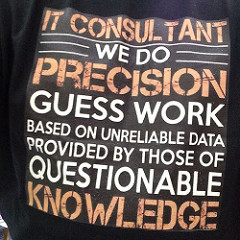 I often talk about my philosophy on blogging, that a blog post is a conversation. This one comes from a conversation with tech author and journalist Howard M. Cohen of HMC Write Now. We were discussing how, with the pace of innovation and evolution in the technology space, vendors and service providers sometimes find themselves in an interesting position — teaching and implementing for their customers what they only just figured out the night before. So I ask, is this a bad thing?
I often talk about my philosophy on blogging, that a blog post is a conversation. This one comes from a conversation with tech author and journalist Howard M. Cohen of HMC Write Now. We were discussing how, with the pace of innovation and evolution in the technology space, vendors and service providers sometimes find themselves in an interesting position — teaching and implementing for their customers what they only just figured out the night before. So I ask, is this a bad thing?
I’ve written before about professional services where I talked about the myth of industry expertise and the relationship between trust and experience. I’ve also written about what I think is the most important skill of the 21st Century — the ability to vet content. But there’s another skill related to what Howard and I were discussing. Successful consultants are able to stay one step ahead of the customer.
I remember in high school taking my first programming class. The mere concept of teaching programming in grade school was so new that my teacher (a math teacher by training) was taking an evening class in computer programming and then coming in to class the next day and teaching us what she had just learned. To a certain extent we already knew more than she did (we were hacking our TRS-80‘s at home) but she helped put some structure around what we knew and filled in the gaps. Was it so bad? As a trained educator, our teacher had experience in taking in knowledge and then creating a framework to transfer that knowledge to her students. The challenge, I would imagine, was the pace at which she needed to do that process. What made her effective was her ability to synthesize what she had just learned and quickly turn it around and teach her class.
Good consultants can synthesize and apply new information quickly and effectively. There is an abundance of information out there but that ability is much more rare. I remember working on Wall Street and looking to hire a consultant to do some programming. We gave all the prospective consultants a programming test: they had 30 minutes to write code for a particular specification. After interviewing dozens of candidates there was only one consultant who was able to finish that program. The most impressive part of the process was he didn’t even know the programming language! He asked for a copy of the manual (the only one to ask) and cranked out the code with time to spare. An impressive display, and it taught me an important lesson: the ability to learn and apply — to synthesize — is very powerful.
As we hire and develop employees, what should we be looking for? It’s clearly not enough to hire for knowledge, or even experience. The ever accelerating rate with which new information and new technology is entering the marketplace creates challenges for those who can’t keep pace and adapt. What I see happening is the most successful 21st Century knowledge workers have the ability to rapidly synthesize information — learning something, contextualizing it, and then being able to effectively apply it.
![]() This post was written as part of the IBM for Midsize Business program, which provides midsize businesses with the tools, expertise and solutions they need to become engines of a smarter planet. I’ve been compensated to contribute to this program, but the opinions expressed in this post are my own and don’t necessarily represent IBM’s positions, strategies or opinions.
This post was written as part of the IBM for Midsize Business program, which provides midsize businesses with the tools, expertise and solutions they need to become engines of a smarter planet. I’ve been compensated to contribute to this program, but the opinions expressed in this post are my own and don’t necessarily represent IBM’s positions, strategies or opinions.